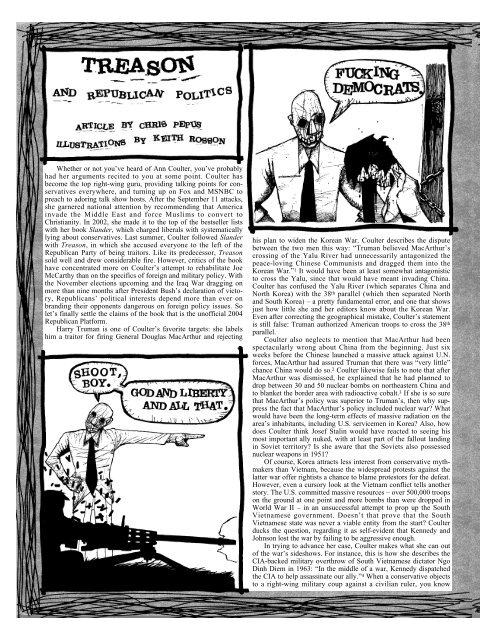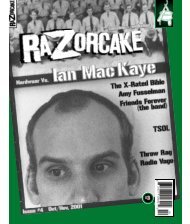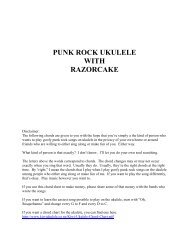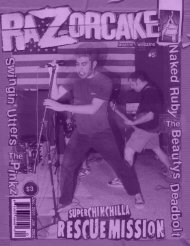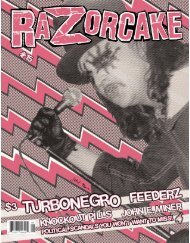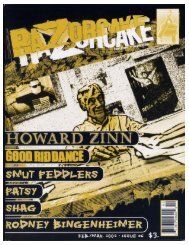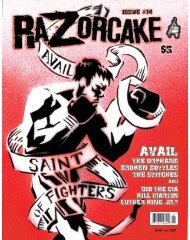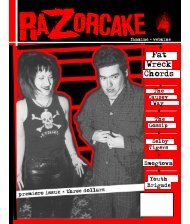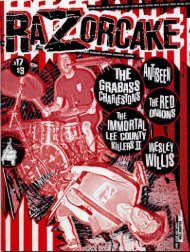Brad: It became a bad luck thing based onthat.Todd: How is Rivethead’s sound differentthan the previous venture some of you werein, Sounds of Corpses Rotting?Nate: I don’t know. It’s like shitty versusless shitty. Out of high school, it was fun.My relatives would always ask, “So, yougraduated. What are you doing?” I can’t say“I’m in Sounds of Corpses Rotting,” so Iwould say, “I’m doing nothing.”Brad: Basically, we wanted to do a bandthat pretty much sounded like Crimpshrineat the time, but we tried to cover“Summertime” in that same band and didn’tever get through it once.Todd: Have you guys ever run into anyinterpretation problems such as, “I’m a rivethead.I’m into gothic industrial music”?Nate: On our message board, on our website,people come on and say, “You guysdon’t know that rivethead means industrial.You stupid punks. We’re into groove industrial.You’re not.” I didn’t realize. When westarted, we called ourselves Rumblefish, andwe heard there was already a band namedthat, so we changed it to avoid that becominga problem. Now, there’s apparently – Ididn’t know this – if you’re into industrialmusic, you’re a rivethead.Zach: And we just named it after the bookby Ben Hamper. We didn’t even know thatwas a thing. Some jerkoff band from Texas,this industrial grooveband, has trademarkedthe name, so everywheretheir name is, it’s Rivethead.Brad: I’d like to see a thing on the industrialmessage board of a bunch of GM factoryworkers. “What the fuck are you callingyourself a rivethead for? We actually do thiseight hours a day, motherfucker.”Paddy: You can’t give a name to your ownsubculture. That’s bullshit. It’s like givingyourself a nickname. “Hey guys, call meKing Groovie.”Todd: How much train hopping do youguys really do?Brad: For awhile, I was doing it really regularly.I pretty much moved out of where Iwas living and traveled all over Canada onthe Canadian Lowline from St. Paul, up toWinnipeg, over to Vancouver, stopping atplaces in between. For awhile, that was whatI was doing. Now, I do it now and then.Right now, I live in my van. I don’t liveanywhere in Minneapolis. Recently, I wasout west. When I was on the West Coast, Irode from Portland down to Oakland. I don’tdo it quite as much as I used to. I tend to gofrom living in a house to not living in ahouse every couple months. Generally, I’llride trains somewhere.Zach: It’s pretty much the same with me. Ihaven’t been doing it as much lately. A couplesummers ago, I went from Miami,Florida, to Portland, Oregon. It was a crazysummer. It took up my entire summer. Ittook me everywhere. It was fucking incredible.Last summer, I went to Milwaukee forbreakfast.Todd: Explain Theta Beta Potata.Nate: Our friend, Dave, I went to highschool with. He was living in Iowa and wasgoing to school for film, and he lived in ahouse that did shows. Obviously, it was atake off of frat houses: Theta Beta Potata.It’s rad. They still do shows there. It wasreally fun.Brad: It was basically a bunch of punk kids,living in a house, doing shows, surroundedby frat kids. “Fuck them. We’re starting ourown frat that’s going to rule and throw punkshows.” And they pulled it off. They actuallyhad the letters. They had the theta, beta,and potato-shaped thing and the universitycame by and made them take it down.“You’re not a frat. You can’t do that.”Todd: What is the FETC?Brad: It’s Freight Edge Train Core. Me andmy friend Steve were traveling acrossCanada and you’d see the straight edgehardcore thing, the X. That didn’t reallyapply to us because we drank a lot. Wedecided to start our own things that wecould write on trains.Todd: Who is Lawrence Miles and why didhe get shot in the back?Brad: He’s a kid in Minneapolis. I think hewas fourteen at the time. He was playingaround with a BB gun and the cops came upand pointed guns at him. He had his backturned to them and didn’t understand whatwas happening because he was scared andhe was a kid. So he ran away and they shothim in the back.Zach: That same cop, Charlie Storley, thispiece of shit, shot another cop while he waslaying on the ground. The cop had beendoing an undercover job and was sitting inhis car. He got shot in the chest by somerandom dude. He got out, radioed for help,and was lying on the ground. This fuck,Charlie Storley, came up and shot him.Nate: He shot Lawrence Miles – this was afew years ago – got a promotion since then,shot a cop in the back and is still a cop withpaid absence.Zach: The cop who got shot was Asian.Ever since, there has been a big backlash inthe local police department against Asiansbecause he’s speaking out about it. He was anormal cop. He wasn’t a nice guy or anything,but he’s speaking out against how hewas treated. They’re doing a lot of things todiscredit him. On the local news coveragethey said that there were rumors that he shothimself so he could avoid going away forthe military. It’s tragic. The police forceisn’t going to hang themselves.Paddy: Not to get all weird or anything, butyou guys are looking at it from a very liberalpoint of view, dude. It’s pretty hard to shoota kid in the back. [laughter] It may soundeasy. I remember the first time Half Pintshot a kid in the back, they were crying for aweek.Todd: Name three things that if you puttogether, makes you think of Rivethead as aband for you. I’m not even talking soundwise.Zach: When I think of Rivethead, I think ofthis old house that me and Brad used to liveat, this punk house in southeastMinneapolis. It was in college town. We’dhave shows in the basement all the time andthey were just really crazy. It was a reallygood period of my life, having Rivetheadshows there all the time made it a lot better.It was a ridiculous house. Me and Brad builtbedrooms in the basement out of plywood.We suckered the people who lived there intoletting us live there for fifty bucks a month,which we, most of the time, didn’t have.Brad: The jobs I have – I work in the TargetCenter in Minneapolis – I have to work aBette Midler concert or something, and runwine coolers up all night. After that, I likedoing something that makes sense to me, bearound people that make sense to me. I’vealways been somewhat involved in the punkrock scene and it just made sense to be in aband.Nate: I work a stupid office job, four days aweek. I get done, I can go play a show orpractice. It’s therapeutic. It’s a better way tospend my time.Todd: It’s your anti-drug.Nate: That is my anti-drug…but I still do drugs.47
Whether or not you’ve heard of Ann Coulter, you’ve probablyhad her arguments recited to you at some point. Coulter hasbecome the top right-wing guru, providing talking points for conservativeseverywhere, and turning up on Fox and MSNBC topreach to adoring talk show hosts. After the September 11 attacks,she garnered national attention by recommending that Americainvade the Middle East and force Muslims to convert toChristianity. In 2002, she made it to the top of the bestseller listswith her book Slander, which charged liberals with systematicallylying about conservatives. Last summer, Coulter followed Slanderwith Treason, in which she accused everyone to the left of theRepublican Party of being traitors. Like its predecessor, Treasonsold well and drew considerable fire. However, critics of the bookhave concentrated more on Coulter’s attempt to rehabilitate JoeMcCarthy than on the specifics of foreign and military policy. Withthe November elections upcoming and the Iraq War dragging onmore than nine months after President Bush’s declaration of victory,Republicans’ political interests depend more than ever onbranding their opponents dangerous on foreign policy issues. Solet’s finally settle the claims of the book that is the unofficial 2004Republican Platform.Harry Truman is one of Coulter’s favorite targets: she labelshim a traitor for firing General Douglas MacArthur and rejectinghis plan to widen the Korean War. Coulter describes the disputebetween the two men this way: “Truman believed MacArthur’scrossing of the Yalu River had unnecessarily antagonized thepeace-loving Chinese Communists and dragged them into theKorean War.” 1 It would have been at least somewhat antagonisticto cross the Yalu, since that would have meant invading China.Coulter has confused the Yalu River (which separates China andNorth Korea) with the 38 th parallel (which then separated Northand South Korea) – a pretty fundamental error, and one that showsjust how little she and her editors know about the Korean War.Even after correcting the geographical mistake, Coulter’s statementis still false: Truman authorized American troops to cross the 38 thparallel.Coulter also neglects to mention that MacArthur had beenspectacularly wrong about China from the beginning. Just sixweeks before the Chinese launched a massive attack against U.N.forces, MacArthur had assured Truman that there was “very little”chance China would do so. 2 Coulter likewise fails to note that afterMacArthur was dismissed, he explained that he had planned todrop between 30 and 50 nuclear bombs on northeastern China andto blanket the border area with radioactive cobalt. 3 If she is so surethat MacArthur’s policy was superior to Truman’s, then why suppressthe fact that MacArthur’s policy included nuclear war? Whatwould have been the long-term effects of massive radiation on thearea’s inhabitants, including U.S. servicemen in Korea? Also, howdoes Coulter think Josef Stalin would have reacted to seeing hismost important ally nuked, with at least part of the fallout landingin Soviet territory? Is she aware that the Soviets also possessednuclear weapons in 1951?Of course, Korea attracts less interest from conservative mythmakersthan Vietnam, because the widespread protests against thelatter war offer rightists a chance to blame protestors for the defeat.However, even a cursory look at the Vietnam conflict tells anotherstory. The U.S. committed massive resources – over 500,000 troopson the ground at one point and more bombs than were dropped inWorld War II – in an unsuccessful attempt to prop up the SouthVietnamese government. Doesn’t that prove that the SouthVietnamese state was never a viable entity from the start? Coulterducks the question, regarding it as self-evident that Kennedy andJohnson lost the war by failing to be aggressive enough.In trying to advance her case, Coulter makes what she can outof the war’s sideshows. For instance, this is how she describes theCIA-backed military overthrow of South Vietnamese dictator NgoDinh Diem in 1963: “In the middle of a war, Kennedy dispatchedthe CIA to help assassinate our ally.” 4 When a conservative objectsto a right-wing military coup against a civilian ruler, you know


